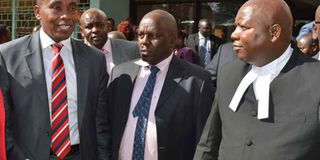Journalists have a right to cover proceedings of county assemblies

From left: Kiambu Senator Kimani Wamatangi, Komothai Ward Rep Mburuti Kinuthia and County Assembly Speaker Gathii Irungu converse outside the county assembly. Speaker Irungu told Kiambu MCAs that the issue of public access to the assembly and its committees is not a matter to be taken lightly. PHOTO | ERIC WAINAINA | NATION MEDIA GROUP
What you need to know:
- The most notable case is that of the Homa Bay County Assembly, which in September last year barred journalists from covering its proceedings because they had reported on the misappropriation of Sh51 million of county funds.
- But in no county assembly, from West Pokot to Mombasa, are reporters usually welcome to report debates and proceedings, especially if they are negative.
On May 17 this year a committee of the Kiambu County Assembly barred reporters, including a Nation Media Group journalist, from a meeting called to discuss alleged misappropriation of the Biashara Fund by county officials. That meant the public was excluded from the hearing.
The committee then adjourned to refer the matter to the Speaker for guidance. Now Speaker Gathii Irungu has spoken.
His ruling in effect raps MCAs on the knuckles. “I politely decline the request to exclude the public from the committee’s meeting and the committee shall proceed with its inquiries with the members of the public present,” he says in his ruling made on June 14.
He gives reasons for his decision that are grounded on the Constitution, Standing Orders, the County Government Act, and other laws, including parliamentary practice in other countries.
He answers many questions and removes doubts that seem to perplex and confuse many MCAs across our 47 counties, and puts to rest the question of whether or not to exclude the media from the affairs of county assemblies.
Speaker Irungu’s ruling — the first of its kind at the county level — sets a precedent for other county assemblies that are wont, on occasion, to bar reporters from covering certain sessions when “sensitive” matters are discussed.
The most notable case is that of the Homa Bay County Assembly, which in September last year barred journalists from covering its proceedings because they had reported on the misappropriation of Sh51 million of county funds.
But in no county assembly, from West Pokot to Mombasa, are reporters usually welcome to report debates and proceedings, especially if they are negative.
Speaker Irungu tells the Kiambu MCAs: “The issue of public access to the assembly and its committees is not a matter to be taken lightly. It is a matter that falls under the umbrella of the concept of public participation, a concept which the Constitution and the Kenyan democracy is anchored upon.
To emphasise this matter further, upon perusal of the Constitution you will realise that the words “public participation” have in fact been mentioned over 18 times, which goes to show how important this concept was to the framers of the Constitution.”
WELL SAID
He quotes Standing Order 209(2), which states that a county assembly may not exclude any media from any sitting unless in exceptional circumstances that the Speaker has determined are justifiable reasons for doing so.
He also quotes the Constitution, which states that sovereign power is vested in the citizens, who may exercise it either directly or indirectly through democratically elected representatives.
He says that for the Speaker to bar the media from having access to the assembly and its committee, the reasons must pass a justification test. In deciding what amounts to justifiable reasons, the Speaker must interpret the Constitution in a manner that, among other things, promotes its purposes.
But of key importance is the value and principle of good governance, integrity, transparency and accountability, and the advancement of the rule and development of the law.
With these values and principles, he says, Kenyan democracy has shifted to a participatory democracy. “This is the foundation of our Constitution, which expressly binds us all and leaves us with no obligation but to comply,” he states.
Speaker Irungu further tells Kiambu MCAs: “It is important to appreciate that the business of the assembly is not only undertaken on the floor, but also in the committees.
In order to advance a more participatory democracy, we have a constitutional obligation to open up all our processes to the public, which includes the media, including the work of parliamentary committees.
The reasoning behind all these provisions is that such public access will better involve the public in legislative decision-making.” Hopefully, we will not have any more cases of reporters being kicked out of county assemblies.
Send your complaints to [email protected]. Call 0721989264





